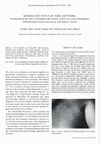June 2020 in “Journal of Investigative Dermatology” The symposium highlighted the importance of genetics in understanding and treating complex skin diseases.
 May 2015 in “Hair transplant forum international”
May 2015 in “Hair transplant forum international” The article concludes that PRP might help with hair loss, but more detailed research is necessary.
[object Object] June 2020 in “Comparative medicine” NSG mice had the most mites, and genetic factors affect immune response and susceptibility.
 50 citations,
March 2021 in “Journal of investigational allergology & clinical immunology”
50 citations,
March 2021 in “Journal of investigational allergology & clinical immunology” Dupilumab is being tested for many new skin, respiratory, and gastrointestinal conditions.
142 citations,
March 2019 in “Molecules/Molecules online/Molecules annual” Cannabinoids may help treat various skin conditions.
 18 citations,
July 2022 in “Frontiers in Immunology”
18 citations,
July 2022 in “Frontiers in Immunology” Volatile organic compounds can cause inflammation and increase the risk of autoimmune diseases.
16 citations,
January 2022 in “International journal of molecular sciences” Certain daily habits like stress, diet, and sleep can affect the severity of hair loss in alopecia areata.
 60 citations,
May 2015 in “Archives of dermatological research”
60 citations,
May 2015 in “Archives of dermatological research” PPAR agonists show promise for skin conditions but need more research before being a main treatment.
 12 citations,
July 2019 in “Acta Neurologica Belgica”
12 citations,
July 2019 in “Acta Neurologica Belgica” Levodopa for Parkinson's disease might be linked to skin issues like melanoma, but it's unclear if the drug or the disease causes them.
 25 citations,
December 2001 in “Expert Opinion on Pharmacotherapy”
25 citations,
December 2001 in “Expert Opinion on Pharmacotherapy” Potassium channel openers show promise for treating heart disease and other conditions, but more research is needed to fully understand their effects and safety.
 434 citations,
October 2003 in “PTR. Phytotherapy research/Phytotherapy research”
434 citations,
October 2003 in “PTR. Phytotherapy research/Phytotherapy research” Natural products in cosmetics are beneficial for skin and hair care with low toxicity.
 46 citations,
September 2014 in “Steroids”
46 citations,
September 2014 in “Steroids” Plant steroid hormones show growth, health, and medicinal benefits in various organisms, including potential for treating diseases.
[object Object]  1 citations,
January 2015 in “Journal of nutrition & health”
1 citations,
January 2015 in “Journal of nutrition & health” Fish oil improves skin health in people with diabetes and high cholesterol.
2 citations,
September 2021 in “Anais Brasileiros de Dermatologia” Increased sunscreen use may be linked to frontal fibrosing alopecia in Hispanic females.
 January 2003 in “American Journal of Clinical Dermatology”
January 2003 in “American Journal of Clinical Dermatology” Various drugs caused different skin reactions, including allergic and inflammatory responses.
 47 citations,
November 2012 in “Pharmaceutical research”
47 citations,
November 2012 in “Pharmaceutical research” Surface-modified nanoparticles mainly use non-follicular pathways to enhance skin permeation of ibuprofen and could improve treatment for inflammatory skin diseases.
 7 citations,
May 2012 in “British Journal of Dermatology”
7 citations,
May 2012 in “British Journal of Dermatology” Chemical exposure may contribute to the rise in atopic diseases and needs more research.
 January 2023 in “Discovery immunology”
January 2023 in “Discovery immunology” T cells and bacteria in the gut and skin help maintain health and protect against disease.
 124 citations,
December 2016 in “Pharmaceuticals”
124 citations,
December 2016 in “Pharmaceuticals” TRP channels in the skin are important for sensation and health, and targeting them could help treat skin disorders.
 195 citations,
January 2008 in “Photochemistry and Photobiology”
195 citations,
January 2008 in “Photochemistry and Photobiology” Visible light can damage skin and most sunscreens don't block it well; more research is needed on its effects and protection methods.
 21 citations,
July 2022 in “Orphanet journal of rare diseases”
21 citations,
July 2022 in “Orphanet journal of rare diseases” New treatments for ichthyosis, like protein replacement and gene therapy, show promise and may become standard care.
 October 2023 in “Frontiers in Medicine”
October 2023 in “Frontiers in Medicine” Dupilumab helped a 4-year-old grow hair back after another treatment failed.
2 citations,
January 1996 in “Annals of saudi medicine/Annals of Saudi medicine” Alopecia areata is unpredictable, with limited treatment effectiveness, especially in severe cases.
 10 citations,
May 1978 in “Acta Dermato Venereologica”
10 citations,
May 1978 in “Acta Dermato Venereologica” Pustules in toxic erythema are linked to hair follicles or sweat ducts.
 69 citations,
June 2017 in “Experimental Biology and Medicine”
69 citations,
June 2017 in “Experimental Biology and Medicine” Advanced human skin models improve drug development and could replace animal testing.
 13 citations,
April 2017 in “Journal of Alternative and Complementary Medicine”
13 citations,
April 2017 in “Journal of Alternative and Complementary Medicine” Traditional and complementary medicine may help with skin conditions, but more high-quality research is needed.
 1 citations,
April 2019 in “The journal of investigative dermatology/Journal of investigative dermatology”
1 citations,
April 2019 in “The journal of investigative dermatology/Journal of investigative dermatology” Melanocyte-associated antigens may play a key role in alopecia areata and could be targets for new treatments.
 October 2023 in “Frontiers in medicine”
October 2023 in “Frontiers in medicine” Targeted immunotherapy could be a promising new treatment for hair regrowth.
 295 citations,
March 2016 in “Life Sciences”
295 citations,
March 2016 in “Life Sciences” Air pollution worsens skin diseases and aging by causing inflammation and oxidative stress.
 159 citations,
December 2007 in “American Journal of Pathology”
159 citations,
December 2007 in “American Journal of Pathology” Stress-related substance P may lead to hair loss and negatively affect hair growth.























